Module 12 Western music Unit 2 Vienna is the centre of European classical music课件(共53张PPT)+内嵌音频
文档属性
| 名称 | Module 12 Western music Unit 2 Vienna is the centre of European classical music课件(共53张PPT)+内嵌音频 | 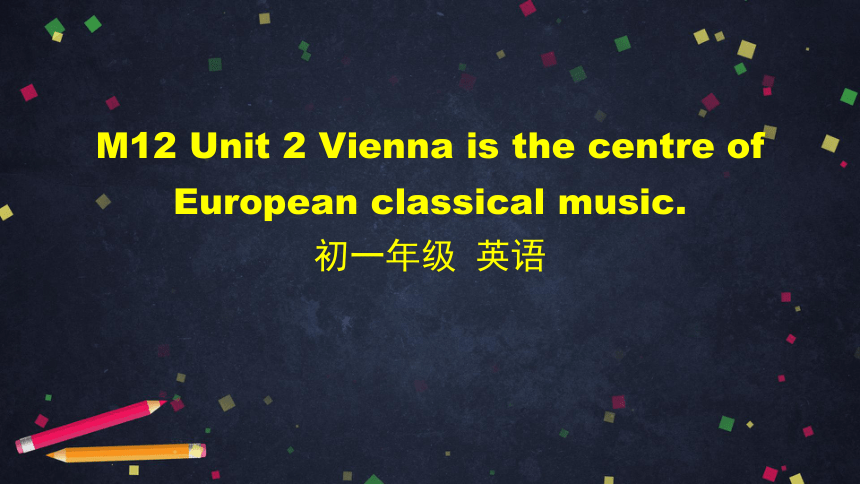 | |
| 格式 | zip | ||
| 文件大小 | 35.6MB | ||
| 资源类型 | 教案 | ||
| 版本资源 | 外研版 | ||
| 科目 | 英语 | ||
| 更新时间 | 2020-06-21 07:44:05 | ||
图片预览

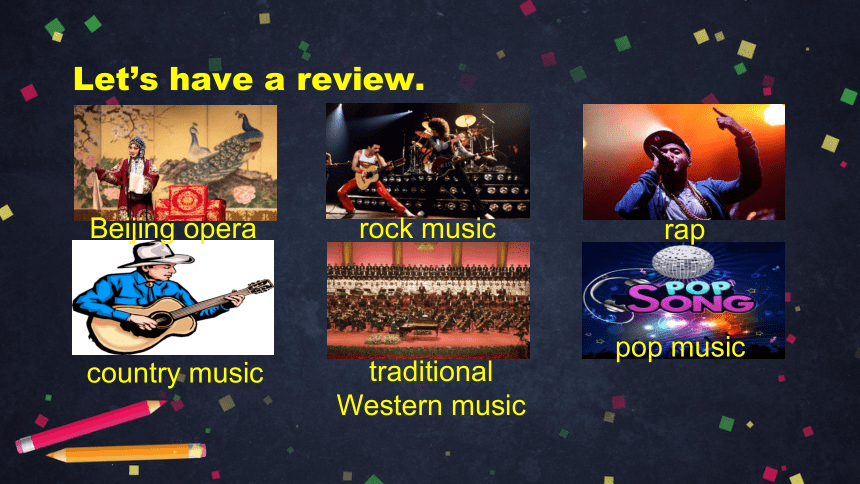
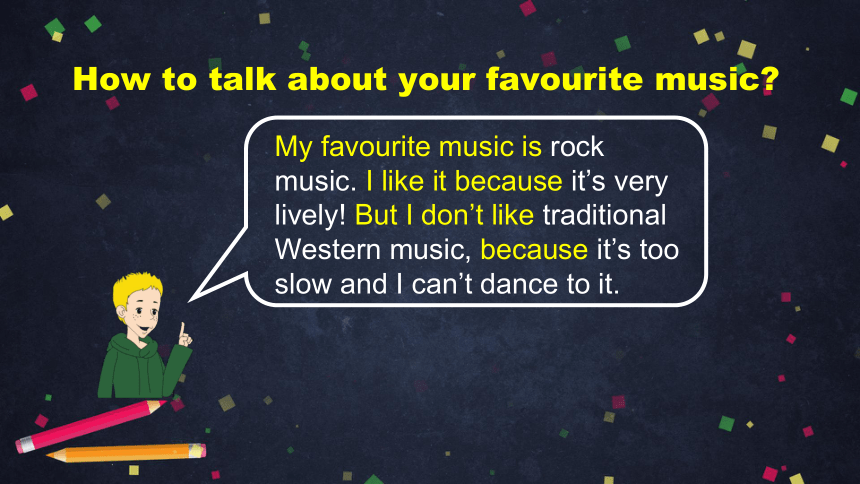
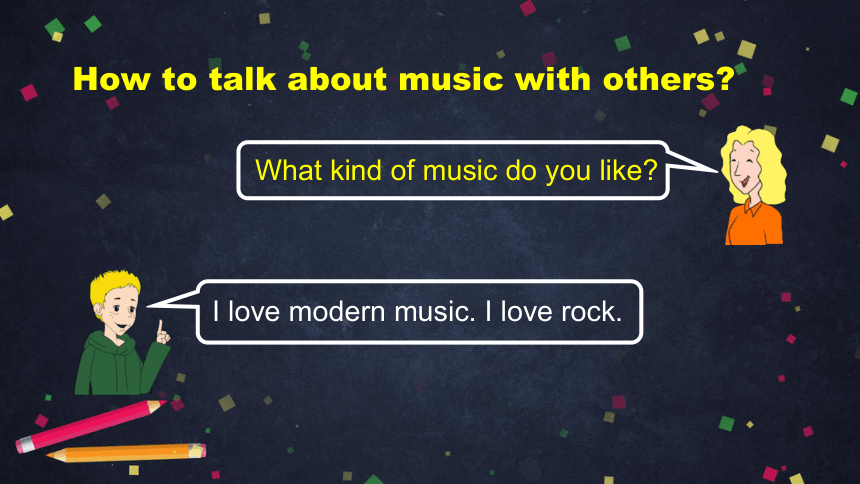
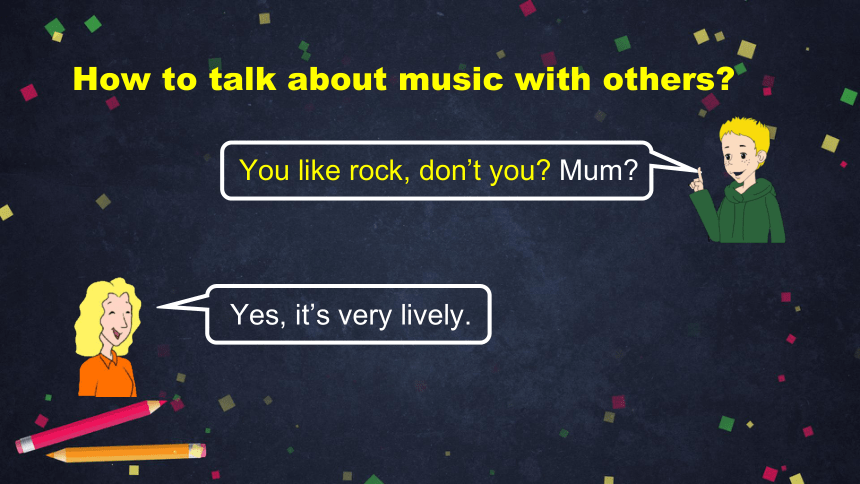
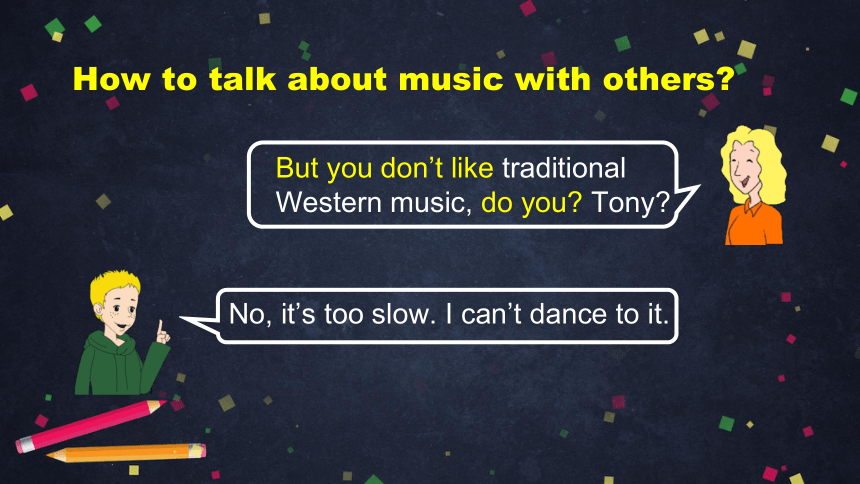
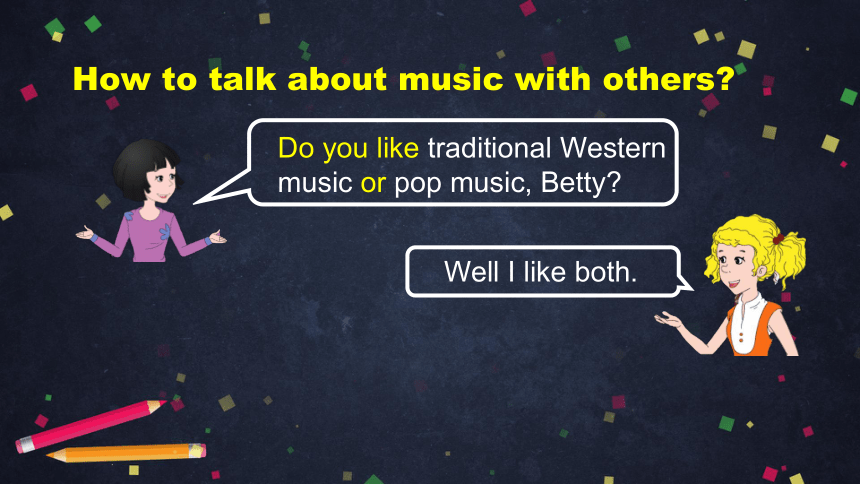
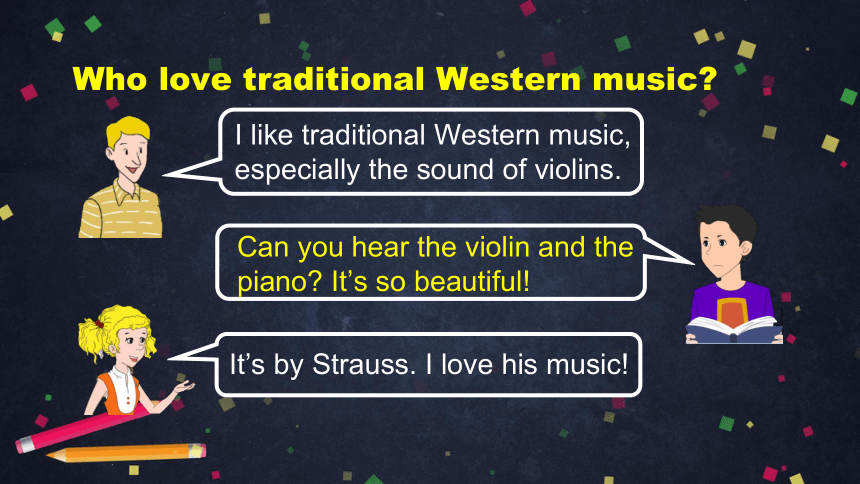
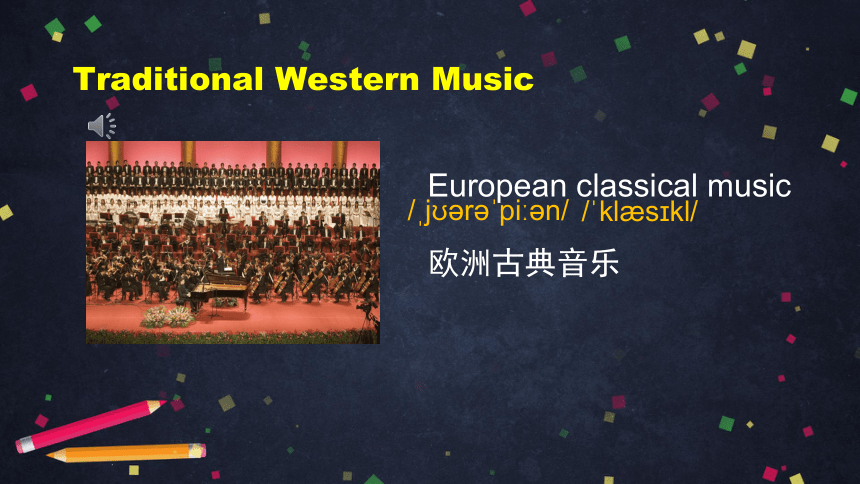
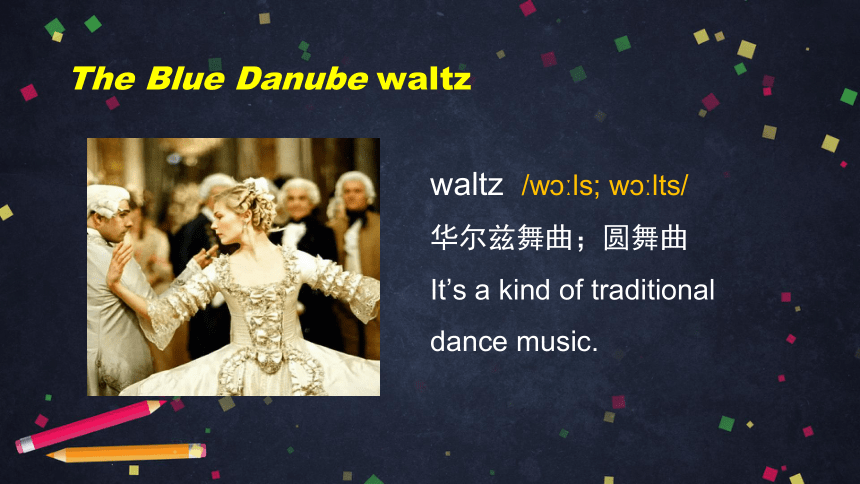
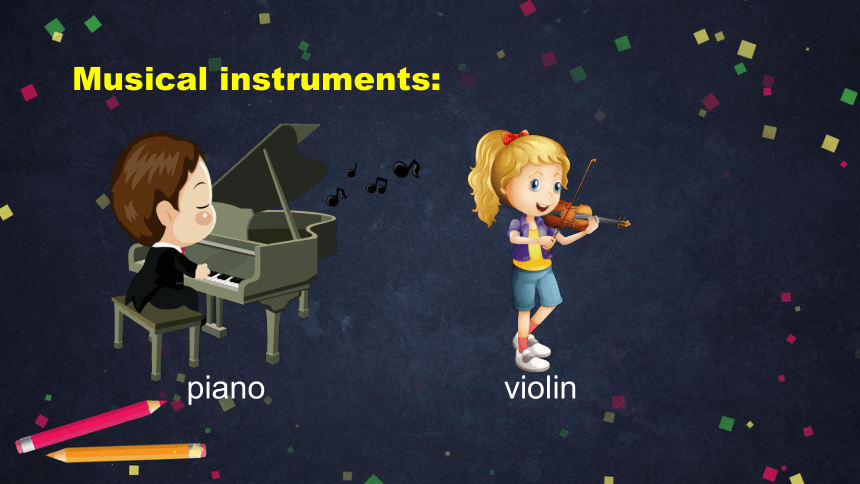
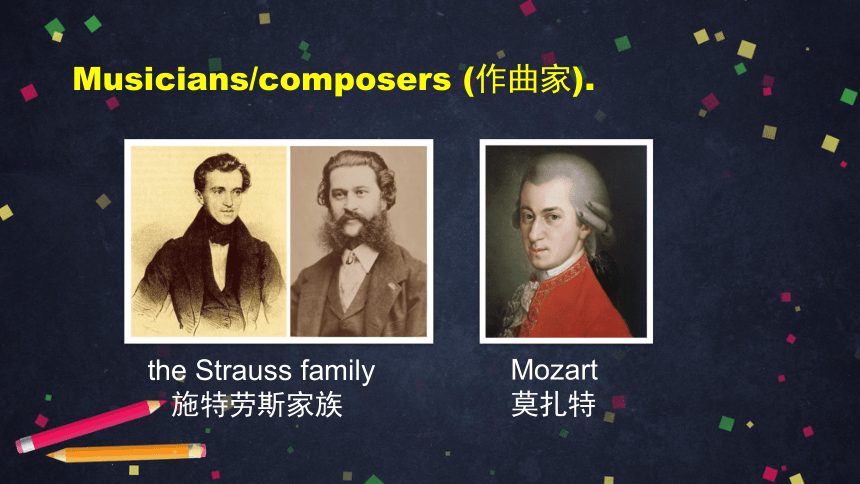
文档简介
(共53张PPT)
M12
Unit
2
Vienna
is
the
centre
of
European
classical
music.
初一年级
英语
Let’s
have
a
review.
traditional
Western
music
rock
music
rap
country
music
pop
music
Beijing
opera
My
favourite
music
is
rock
music.
I
like
it
because
it’s
very
lively!
But
I
don’t
like
traditional
Western
music,
because
it’s
too
slow
and
I
can’t
dance
to
it.
How
to
talk
about
your
favourite
music?
How
to
talk
about
music
with
others?
I
love
modern
music.
I
love
rock.
What
kind
of
music
do
you
like?
How
to
talk
about
music
with
others?
Yes,
it’s
very
lively.
You
like
rock,
don’t
you?
Mum?
How
to
talk
about
music
with
others?
But
you
don’t
like
traditional
Western
music,
do
you?
Tony?
No,
it’s
too
slow.
I
can’t
dance
to
it.
How
to
talk
about
music
with
others?
Do
you
like
traditional
Western
music
or
pop
music,
Betty?
Well
I
like
both.
Who
love
traditional
Western
music?
I
like
traditional
Western
music,
especially
the
sound
of
violins.
Can
you
hear
the
violin
and
the
piano?
It’s
so
beautiful!
It’s
by
Strauss.
I
love
his
music!
Traditional
Western
Music
European
classical
music
欧洲古典音乐
/?j??r??pi??n/
/?kl?s?kl/
The
Blue
Danube
waltz
waltz
/w??ls;
w??lts/
华尔兹舞曲;圆舞曲
It’s
a
kind
of
traditional
dance
music.
Musical
instruments:
piano
violin
Musicians/composers
(作曲家).
the
Strauss
family
施特劳斯家族
Mozart
莫扎特
Describe
the
picture
using
the
given
words
(Activity
1).
concert
音乐会
musician
音乐家
piano
violin
This
is
a
classical
music
concert.
Musicians
are
playing
the
piano
and
the
violins.
Read
and
match.
Mozart’s
life
story
The
Strauss
family
and
their
works
An
introduction
of
Vienna
Para.1
Para.
2
Para.
3
Read
and
match.
Mozart’s
life
story
The
Strauss
family
and
their
works
An
introduction
of
Vienna
Para.1
Para.
2
Para.
3
Read
and
match.
Mozart’s
life
story
The
Strauss
family
and
their
works
An
introduction
of
Vienna
Para.1
Para.
2
Para.
3
Read
and
match.
Mozart’s
life
story
The
Strauss
family
and
their
works
An
introduction
of
Vienna
Para.1
Para.
2
Para.
3
1.
Many
musicians
came
to
study
and
work
in
Vienna.
2.
Strauss
the
younger
played
the
piano,
the
violin
and
the
drums
at
the
age
of
six.
3.
Mozart’s
family
took
him
around
Europe.
4.
The
father,
Johann
Strauss,
died
in
1791.
5.
Mozart
wrote
The
Blue
Danube.
Read
the
passage
and
check
(√)
the
true
sentences
(Activity
2).
1.
Many
musicians
came
to
study
and
work
in
Vienna.
√
Read
the
passage
and
check
(√)
the
true
sentences
(Activity
2).
2.
Strauss
the
younger
played
the
piano,
the
violin
and
the
drums
at
the
age
of
six.
Mozart
Read
the
passage
and
check
(√)
the
true
sentences
(Activity
2).
3.
Mozart’s
family
took
him
around
Europe.
√
Read
the
passage
and
check
(√)
the
true
sentences
(Activity
2).
4.
The
father,
Johann
Strauss,
died
in
1791.
Mozart
Read
the
passage
and
check
(√)
the
true
sentences
(Activity
2).
5.
Mozart
wrote
The
Blue
Danube.
Johann
Strauss
the
younger
Read
the
passage
and
check
(√)
the
true
sentences
(Activity
2).
1.
Where
is
Vienna?
2.
What
music
did
Johann
Strauss
the
elder
write?
3.
How
many
waltzes
did
Johann
Strauss
the
younger
write?
4.
When
was
Mozart
born?
5.
How
old
was
Mozart
when
he
died?
Read
the
passage
and
answer
the
questions
(Activity
3).
1.
Where
is
Vienna?
It
is
in
Austria.
/
It
is
on
the
River
Danube
in
the
centre
of
Europe.
Read
the
passage
and
answer
the
questions
(Activity
3).
2.
What
music
did
Johann
Strauss
the
elder
write?
3.
How
many
waltzes
did
Johann
Strauss
the
younger
write?
Read
the
passage
and
answer
the
questions
(Activity
3).
2.
What
music
did
Johann
Strauss
the
elder
write?
He
wrote
music
for
traditional
dances,
called
the
waltz.
Read
the
passage
and
answer
the
questions
(Activity
3).
3.
How
many
waltzes
did
Johann
Strauss
the
younger
write?
He
wrote
over
150
waltzes.
Read
the
passage
and
answer
the
questions
(Activity
3).
Read
the
passage
and
answer
the
questions
(Activity
3).
4.
When
was
Mozart
born?
5.
How
old
was
Mozart
when
he
died?
Read
the
passage
and
answer
the
questions
(Activity
3).
4.
When
was
Mozart
born?
He
was
born
in
1756.
5.
How
old
was
Mozart
when
he
died?
He
was
only
35
when
he
died.
Read
and
fill
in
the
blanks.
Read
and
fill
in
the
blanks.
In
1756
Mozart
was
born
in
.
Before
six
He
played
not
only
the
but
also
the
.
Austria
violin
piano
Later
His
family
took
him
around
and
he
in
many
cities.
In
1791
He
became
very
and
died.
Read
and
fill
in
the
blanks.
Europe
gave
concerts
poor
Com-ments
He
was
a
great
European
.
Many
people
still
think
his
music
is
.
Read
and
fill
in
the
blanks.
perfect
musician
In
1756
Mozart
was
born
in
.
Before
six
He
played
not
only
the
but
also
the
.
Later
His
family
took
him
around
and
he
in
many
cities.
In
1791
He
became
very
and
died.
Comments
He
was
a
great
European
.
Many
people
still
think
his
music
is
.
perfect
Austria
violin
Europe
musician
gave
concerts
poor
piano
Can
you
introduce
Mozart?
another
elder
European
perfect
poor
popular
Both
Strauss
the
(1)
and
Strauss
the
younger
wrote
some
very
(2)
music.
(3)
successful
composer
from
Vienna
was
Mozart,
but
he
became
very
(4)
and
died
at
the
age
of
thirty-five.
Many
people
think
Mozart’s
music
is
(5)
.
All
three
were
great
(6)
musicians.
elder
Another
popular
poor
perfect
European
Complete
the
passage
with
the
correct
form
of
the
words
from
the
box
(Activity
4).
How
to
introduce
your
favourite
musician
to
others?
How
to
introduce
Strauss
the
elder?
Johann
Strauss
the
elder
wrote
and
played
music
for
traditional
dances,
called
the
waltz.
His
dance
music
made
him
famous
all
over
Europe.
What
music
did
he/her
write?
What
made
him/her
so
famous?
Johann
Strauss
the
younger
was
also
very
successful
and
popular.
He
wrote
over
150
waltzes.
In
1867
he
wrote
The
Blue
Danube
waltz.
How
to
introduce
Strauss
the
younger?
What
music
did
the
musician
write?
How
did
people
comment
on
him/her?
How
to
introduce
Mozart?
1.
When
and
where
was
the
musician
born?
2.
What
did
the
musician
do
when
he/she
was
young?
How
to
introduce
Mozart?
3.
When
did
the
musician
die?
4.
How
did
people
comment
on
the
musician?
How
to
introduce
Beethoven?
·
Beethoven
·
one
of
the
greatest
musicians
·
born
in
1770,
Germany
·
gave
first
piano
concert,
when
7
·
could
hear
nothing,
in
the
last
ten
years
of
his
life
·
died,
when
56
How
to
introduce
Beethoven?
How
did
people
comment
on
him?
When
and
where
was
he
born?
What
did
he
do
when
he
was
young?
What
made
him
special?
When
did
he
die?
How
to
introduce
Beethoven?
How
did
people
comment
on
him?
Beethoven
was
one
of
the
greatest
musicians
in
the
world.
·
Beethoven
·
one
of
the
greatest
musicians
·
born
in
1770,
Germany
·
gave
first
piano
concert,
when
7
·
could
hear
nothing,
in
the
last
ten
years
of
his
life
·
died,
when
56
How
to
introduce
Beethoven?
When
and
where
was
he
born?
He
was
born
in
1770
in
Germany.
·
Beethoven
·
one
of
the
greatest
musicians
·
born
in
1770,
Germany
·
gave
first
piano
concert,
when
7
·
could
hear
nothing,
in
the
last
ten
years
of
his
life
·
died,
when
56
How
to
introduce
Beethoven?
What
did
he
do
when
he
was
young?
He
gave
his
first
piano
concert
when
he
was
only
seven
years
old.
·
Beethoven
·
one
of
the
greatest
musicians
·
born
in
1770,
Germany
·
gave
first
piano
concert,
when
7
·
could
hear
nothing,
in
the
last
ten
years
of
his
life
·
died,
when
56
How
to
introduce
Beethoven?
What
made
him
special?
He
could
hear
nothing
in
the
last
ten
years
of
his
life,
but
he
still
played
the
piano.
·
Beethoven
·
one
of
the
greatest
musicians
·
born
in
1770,
Germany
·
gave
first
piano
concert,
when
7
·
could
hear
nothing,
in
the
last
ten
years
of
his
life
·
died,
when
56
How
to
introduce
Beethoven?
When
did
he
die?
He
died
when
he
was
fifty-six.
·
Beethoven
·
one
of
the
greatest
musicians
·
born
in
1770,
Germany
·
gave
first
piano
concert,
when
7
·
could
hear
nothing,
in
the
last
ten
years
of
his
life
·
died,
when
56
How
to
introduce
Beethoven?
Beethoven
was
one
of
the
greatest
musicians
in
the
world.
He
was
born
in
1770
in
Germany.
He
gave
his
first
piano
concert
when
he
was
only
seven
years
old.
He
could
hear
nothing
in
the
last
ten
years
of
his
life,
but
he
still
played
the
piano.
And
he
died
when
he
was
fifty-six.
Homework:
1.
Use
the
notes
to
write
a
passage
about
the
Chinese
composer
Xian
Xinghai
(Activity
5).
2.
Finish
the
exercises
on
your
worksheet.
Thank
you!
M12
Unit
2
Vienna
is
the
centre
of
European
classical
music.
初一年级
英语
Let’s
have
a
review.
traditional
Western
music
rock
music
rap
country
music
pop
music
Beijing
opera
My
favourite
music
is
rock
music.
I
like
it
because
it’s
very
lively!
But
I
don’t
like
traditional
Western
music,
because
it’s
too
slow
and
I
can’t
dance
to
it.
How
to
talk
about
your
favourite
music?
How
to
talk
about
music
with
others?
I
love
modern
music.
I
love
rock.
What
kind
of
music
do
you
like?
How
to
talk
about
music
with
others?
Yes,
it’s
very
lively.
You
like
rock,
don’t
you?
Mum?
How
to
talk
about
music
with
others?
But
you
don’t
like
traditional
Western
music,
do
you?
Tony?
No,
it’s
too
slow.
I
can’t
dance
to
it.
How
to
talk
about
music
with
others?
Do
you
like
traditional
Western
music
or
pop
music,
Betty?
Well
I
like
both.
Who
love
traditional
Western
music?
I
like
traditional
Western
music,
especially
the
sound
of
violins.
Can
you
hear
the
violin
and
the
piano?
It’s
so
beautiful!
It’s
by
Strauss.
I
love
his
music!
Traditional
Western
Music
European
classical
music
欧洲古典音乐
/?j??r??pi??n/
/?kl?s?kl/
The
Blue
Danube
waltz
waltz
/w??ls;
w??lts/
华尔兹舞曲;圆舞曲
It’s
a
kind
of
traditional
dance
music.
Musical
instruments:
piano
violin
Musicians/composers
(作曲家).
the
Strauss
family
施特劳斯家族
Mozart
莫扎特
Describe
the
picture
using
the
given
words
(Activity
1).
concert
音乐会
musician
音乐家
piano
violin
This
is
a
classical
music
concert.
Musicians
are
playing
the
piano
and
the
violins.
Read
and
match.
Mozart’s
life
story
The
Strauss
family
and
their
works
An
introduction
of
Vienna
Para.1
Para.
2
Para.
3
Read
and
match.
Mozart’s
life
story
The
Strauss
family
and
their
works
An
introduction
of
Vienna
Para.1
Para.
2
Para.
3
Read
and
match.
Mozart’s
life
story
The
Strauss
family
and
their
works
An
introduction
of
Vienna
Para.1
Para.
2
Para.
3
Read
and
match.
Mozart’s
life
story
The
Strauss
family
and
their
works
An
introduction
of
Vienna
Para.1
Para.
2
Para.
3
1.
Many
musicians
came
to
study
and
work
in
Vienna.
2.
Strauss
the
younger
played
the
piano,
the
violin
and
the
drums
at
the
age
of
six.
3.
Mozart’s
family
took
him
around
Europe.
4.
The
father,
Johann
Strauss,
died
in
1791.
5.
Mozart
wrote
The
Blue
Danube.
Read
the
passage
and
check
(√)
the
true
sentences
(Activity
2).
1.
Many
musicians
came
to
study
and
work
in
Vienna.
√
Read
the
passage
and
check
(√)
the
true
sentences
(Activity
2).
2.
Strauss
the
younger
played
the
piano,
the
violin
and
the
drums
at
the
age
of
six.
Mozart
Read
the
passage
and
check
(√)
the
true
sentences
(Activity
2).
3.
Mozart’s
family
took
him
around
Europe.
√
Read
the
passage
and
check
(√)
the
true
sentences
(Activity
2).
4.
The
father,
Johann
Strauss,
died
in
1791.
Mozart
Read
the
passage
and
check
(√)
the
true
sentences
(Activity
2).
5.
Mozart
wrote
The
Blue
Danube.
Johann
Strauss
the
younger
Read
the
passage
and
check
(√)
the
true
sentences
(Activity
2).
1.
Where
is
Vienna?
2.
What
music
did
Johann
Strauss
the
elder
write?
3.
How
many
waltzes
did
Johann
Strauss
the
younger
write?
4.
When
was
Mozart
born?
5.
How
old
was
Mozart
when
he
died?
Read
the
passage
and
answer
the
questions
(Activity
3).
1.
Where
is
Vienna?
It
is
in
Austria.
/
It
is
on
the
River
Danube
in
the
centre
of
Europe.
Read
the
passage
and
answer
the
questions
(Activity
3).
2.
What
music
did
Johann
Strauss
the
elder
write?
3.
How
many
waltzes
did
Johann
Strauss
the
younger
write?
Read
the
passage
and
answer
the
questions
(Activity
3).
2.
What
music
did
Johann
Strauss
the
elder
write?
He
wrote
music
for
traditional
dances,
called
the
waltz.
Read
the
passage
and
answer
the
questions
(Activity
3).
3.
How
many
waltzes
did
Johann
Strauss
the
younger
write?
He
wrote
over
150
waltzes.
Read
the
passage
and
answer
the
questions
(Activity
3).
Read
the
passage
and
answer
the
questions
(Activity
3).
4.
When
was
Mozart
born?
5.
How
old
was
Mozart
when
he
died?
Read
the
passage
and
answer
the
questions
(Activity
3).
4.
When
was
Mozart
born?
He
was
born
in
1756.
5.
How
old
was
Mozart
when
he
died?
He
was
only
35
when
he
died.
Read
and
fill
in
the
blanks.
Read
and
fill
in
the
blanks.
In
1756
Mozart
was
born
in
.
Before
six
He
played
not
only
the
but
also
the
.
Austria
violin
piano
Later
His
family
took
him
around
and
he
in
many
cities.
In
1791
He
became
very
and
died.
Read
and
fill
in
the
blanks.
Europe
gave
concerts
poor
Com-ments
He
was
a
great
European
.
Many
people
still
think
his
music
is
.
Read
and
fill
in
the
blanks.
perfect
musician
In
1756
Mozart
was
born
in
.
Before
six
He
played
not
only
the
but
also
the
.
Later
His
family
took
him
around
and
he
in
many
cities.
In
1791
He
became
very
and
died.
Comments
He
was
a
great
European
.
Many
people
still
think
his
music
is
.
perfect
Austria
violin
Europe
musician
gave
concerts
poor
piano
Can
you
introduce
Mozart?
another
elder
European
perfect
poor
popular
Both
Strauss
the
(1)
and
Strauss
the
younger
wrote
some
very
(2)
music.
(3)
successful
composer
from
Vienna
was
Mozart,
but
he
became
very
(4)
and
died
at
the
age
of
thirty-five.
Many
people
think
Mozart’s
music
is
(5)
.
All
three
were
great
(6)
musicians.
elder
Another
popular
poor
perfect
European
Complete
the
passage
with
the
correct
form
of
the
words
from
the
box
(Activity
4).
How
to
introduce
your
favourite
musician
to
others?
How
to
introduce
Strauss
the
elder?
Johann
Strauss
the
elder
wrote
and
played
music
for
traditional
dances,
called
the
waltz.
His
dance
music
made
him
famous
all
over
Europe.
What
music
did
he/her
write?
What
made
him/her
so
famous?
Johann
Strauss
the
younger
was
also
very
successful
and
popular.
He
wrote
over
150
waltzes.
In
1867
he
wrote
The
Blue
Danube
waltz.
How
to
introduce
Strauss
the
younger?
What
music
did
the
musician
write?
How
did
people
comment
on
him/her?
How
to
introduce
Mozart?
1.
When
and
where
was
the
musician
born?
2.
What
did
the
musician
do
when
he/she
was
young?
How
to
introduce
Mozart?
3.
When
did
the
musician
die?
4.
How
did
people
comment
on
the
musician?
How
to
introduce
Beethoven?
·
Beethoven
·
one
of
the
greatest
musicians
·
born
in
1770,
Germany
·
gave
first
piano
concert,
when
7
·
could
hear
nothing,
in
the
last
ten
years
of
his
life
·
died,
when
56
How
to
introduce
Beethoven?
How
did
people
comment
on
him?
When
and
where
was
he
born?
What
did
he
do
when
he
was
young?
What
made
him
special?
When
did
he
die?
How
to
introduce
Beethoven?
How
did
people
comment
on
him?
Beethoven
was
one
of
the
greatest
musicians
in
the
world.
·
Beethoven
·
one
of
the
greatest
musicians
·
born
in
1770,
Germany
·
gave
first
piano
concert,
when
7
·
could
hear
nothing,
in
the
last
ten
years
of
his
life
·
died,
when
56
How
to
introduce
Beethoven?
When
and
where
was
he
born?
He
was
born
in
1770
in
Germany.
·
Beethoven
·
one
of
the
greatest
musicians
·
born
in
1770,
Germany
·
gave
first
piano
concert,
when
7
·
could
hear
nothing,
in
the
last
ten
years
of
his
life
·
died,
when
56
How
to
introduce
Beethoven?
What
did
he
do
when
he
was
young?
He
gave
his
first
piano
concert
when
he
was
only
seven
years
old.
·
Beethoven
·
one
of
the
greatest
musicians
·
born
in
1770,
Germany
·
gave
first
piano
concert,
when
7
·
could
hear
nothing,
in
the
last
ten
years
of
his
life
·
died,
when
56
How
to
introduce
Beethoven?
What
made
him
special?
He
could
hear
nothing
in
the
last
ten
years
of
his
life,
but
he
still
played
the
piano.
·
Beethoven
·
one
of
the
greatest
musicians
·
born
in
1770,
Germany
·
gave
first
piano
concert,
when
7
·
could
hear
nothing,
in
the
last
ten
years
of
his
life
·
died,
when
56
How
to
introduce
Beethoven?
When
did
he
die?
He
died
when
he
was
fifty-six.
·
Beethoven
·
one
of
the
greatest
musicians
·
born
in
1770,
Germany
·
gave
first
piano
concert,
when
7
·
could
hear
nothing,
in
the
last
ten
years
of
his
life
·
died,
when
56
How
to
introduce
Beethoven?
Beethoven
was
one
of
the
greatest
musicians
in
the
world.
He
was
born
in
1770
in
Germany.
He
gave
his
first
piano
concert
when
he
was
only
seven
years
old.
He
could
hear
nothing
in
the
last
ten
years
of
his
life,
but
he
still
played
the
piano.
And
he
died
when
he
was
fifty-six.
Homework:
1.
Use
the
notes
to
write
a
passage
about
the
Chinese
composer
Xian
Xinghai
(Activity
5).
2.
Finish
the
exercises
on
your
worksheet.
Thank
you!
同课章节目录
- Module 1 Lost and found
- Unit 1 Whose bag is this?
- Unit 2 Are they yours?
- Unit 3 Language in use
- Module 2 What can you do ?
- Unit 1 I can play the piano
- Unit 2 I can run really fast
- Unit 3 Language in use
- Module 3 Making plans
- Unit 1 What are you going to do at the weekends?
- Unit 2 We're going to cheer the players.
- Unit 3 Language in use
- Module 4 Life in the future
- Unit 1 Everyone will study at home
- Unit 2 Every family will have a small plane.
- Unit 3 Language in use
- Module 5 Shopping
- Unit 1 What can I do for you?
- Unit 2 You can buy everything on the Internet
- Unit 3 Language in use
- Module 6 Around town
- Unit 1 Could you tell me how to get to the Nationa
- Unit 2 The London Eye is on your right.
- Unit 3 Language in use
- Revision module A
- Module 7 My past life
- Unit 1 I was born in a small village.
- Unit 2 I was born in Quincy.
- Unit 3 Language in use
- Module 8 Story time
- Unit 1 Once upon a time….
- Unit 2 Goldilocks hurried out of the house.
- Unit 3 Language in use
- Module 9 Life history
- Unit 1 He left school and began work at the age of
- Unit 2 He decided to be an actor.
- Unit 3 Language in use
- Module 10 A holiday journey
- Unit 1 What did you do?
- Unit 2 This morning we took a walk.
- Unit 3 Language in use
- Module 11 Body language
- Unit 1 They touch noses!
- Unit 2 Here are some ways to welcome them.
- Unit 3 Language in use
- Module 12 Western music
- Unit 1 It's so beautiful!
- Unit 2 Vienna is the centre of European classical
- Unit 3 Language in use
- Revision module B
